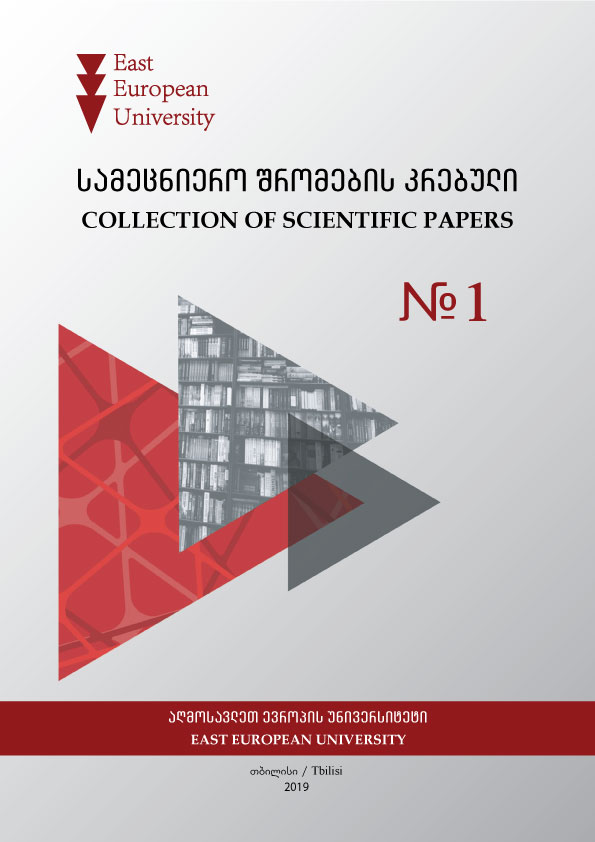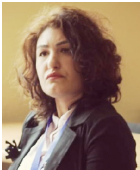განათლების ინტერნაციონალიზაცია _ აღმოსავლეთ საქართველოში გაცვლით პროგრამებზე სტუდენტების ხელმისაწვდომობის კვლევა გენდერულ ჭრილში
Main Article Content
რეზიუმე
იმ დროს როდესაც, ევროინტეგრაცია ქვეყნის ერთ-ერთი პრიორიტეტული მიზანია, ვფიქრობ, განსაკუთრებული
მნიშვნელობა ენიჭება საქართველოში უმაღლესი საგანმანათლებლო დაწესებულებების ინტერნაციონალიზაციას,
ამ მიმართულებით პრობლემების იდენტიფიცირებას, შემდგომ კი, ქმედითი ნაბიჯების
დაგეგმვა-განხორციელებას. სწორედ ამ მიზანს ემსახურება წინამდებარე ნაშრომი, რომლის წინასწარი
დაშვებით გენდერული სტერეოტიპები, კულტურული ასპექტები და ოჯახური ტრადიციები საქართველო-
ში უარყოფით გავლენას ახდენენ სტუდენტთა გაცვლით პროგრამებზე თანაბარ წვდომაზე საქართველო-
ში (ეს პრობლემა ძირითადად ეხება გოგონებს, რომელთა საზღვარგარეთ `გაშვების~ საკითხს, როგორც
წესი, საქართველოში ოჯახი წყვეტს). კვლევამ გამოავლინა, რომ გაცვლით პროგრამებში გოგონების
მონაწილეობა იზრდება წლების მიხედვით, მამაკაცთა რიცხოვნობა კი მცირედად მატების ტენდენციას
ავლენს. აღნიშნული აბსოლუტურ თანხვედრაშია ევროპაში მიმდინარე მოვლენებთან, სადაც მდედრობითი
სქესის მონაწილეობამ გადააჭარბა მამაკაცთა მონაწილეობას. იმ ფონზე, როდესაც აღნიშნული საკითხი
მცირედადაც კი არ არის გამოკვლეული, წინამდებარე ნაშრომმა შესაძლებელია, შეავსოს ლიტერატურაში
არსებული დანაკლისი ან საფუძველი ჩაუყაროს კვლევებს.
Article Details

ამ ნაშრომზე მოქმედებს Creative Commons Attribution 4.0 საერთაშორისო ლიცენზია.
გამოყენებული ლიტერატურა
ACKERS L. (2008): Internationalisation, Mobility and Metrics: A New Form of Indirectc Descrimination? In:
Minerva, Volume 46, Issue 4.
BÖTTCHER L., ARAÙJO, N. A. M., NAGLER J., MENDES J. F. F., HELBING D., HERRMANN H. J. (2016):
Gender Gap in the ERASMUS Mobility Program. PLoS ONE 11(2): e0149514. https://doi.org/10.1371/journal.
pone.0149514
BRANDENBURG U., DE WIT H. (2011): The End of Internationalization. In: International Higher Education. No
Center for International Higher Education, Boston College, Boston.
CENTER FOR CIVIL INTEGRATION AND INTER-ETHNIC RELATIONS (2014): Research of Intercultural
Education Aspects of Teacher Education Programs at Georgian Higher Education Institutions, Tbilisi.
CRESWELL, J.W. (2012): Educational Research. Planning, Conducting, and Evaluating Quantitative and
Qualitative Research, Boston et al.
DE WITH. (2011): Globalisation and Internationalisation of Higher Education. RUSC VOL. 8 No 2. Universitat
Oberta de Catalunya, Barcelona.
DE WIT H. (2013): An Introduction to Higher Education. Center for Higher Education Internationalisation,
Universitã Cattolica del Sacro Cuore, Milan.
EUROSTUDENT (2016): Intelligence Brief No. 2. What are the Obstacles to Students Mobility During the Decision
and Planning Phase? https://www.eurostudent.eu/download_files/documents/EV_IB_mobility_obstacles.pdf
EUROPEAN COMMISSION (2012): Higher Education in Georgia. (2012). Tempus. Retrieved January, 2017,
http://erasmusplus.org.ge/files/publications/Georgia%20Country%20Fiche%202012%20-%20en.pdf
EUROPEAN COMMISSION (2016): Annual Report 2016 Erasmus+.
EUROPEAN COMMISSION (2014): Erasmus Facts, Figures & Trends. The European Union support for student
and staff exchanges and university cooperation in 2012-2013. https://ec.europa.eu/assets/eac/education/
library/statistics/erasmus-plus-annual-report_en.pdf
ERASMUS STUDENTS NETWORK TBILISI, Erasmus+ National Office (2014): Erasmus Mundus Mobility
Assessment for 2013-2014.
ERASMUS STUDENTS NETWORK TBILISI, Erasmus+ National Office (2015): Erasmus Survey of Regions for
-2015.
EHEA (2011): Mobility for Better Learning. Mobility Strategy 2020 for the European Higher Education Area.
Working paper.
GORGADZE N. (2016): Gender Equality of Georgia: General context and statistics, Tbilisi.
ekaterine beniaSvili, ian boemi
ganaTlebis internacionalizacia _ aRmosavleT saqarTveloSi
gacvliT programebze studentebis xelmisawvdomobis kvleva genderul WrilSi
samecniero Sromebis krebuli 2019
GRABHER A., WEJWAR P., UNGER M., TERZIEVA B. (2014): Student Mobility in the EHEA. Underrepresentation
in Student Credit Mobility and imbalances in degree mobility. Institute for Advanced Studies, Vienna.
ISAKADZE T., GVIANISHVILI N. (2014). Study of Teachers‘ Knowledge and Attitudes towards Gender Equality.
Training and Research Group Project “Implementing Gender Equality in Schools”, Tbilisi.
KIKNADZE, T., DONADZE, N. (2006): Gender - Social and Political Studies, Tbilisi.
NATIONAL REVIEW of the Implementation of the Beijing Declaration and Platform for Action (2014).
NETZ N., ORR D., GWOSĆ C., HUß B. (2012): What deters students from studying abroad? Evidence from
Austria, Switzerland, Germany, the Netherlands and Poland. Institute of Higher Education, Federal Ministry of
Education and Research of Germany, Bonn.
ORR D. (2015): Where do internationally mobily students come from and where do they go? An Overview of the
Flows of Internationally Mobile Students. http://uis.unesco.org/en/uis-student-flow
STROUT A. H., (2010): Who Plans (Not) to Study Abroad? An Examination of U.S. Student Intent. University of
Massachusetts, Amherst.
TABATADZE S., GORGADZE N. (2013): Research of Intercultural Education Aspects of Elementary Schools in
Georgia. Center for Civil Integration and Inter-ethnic Relations, Tbilisi.
K.M. UHLY, L.M. VISSER & K.S. ZIPPEL (2017): Gendered patterns in international research collaborations in
academia, Studies in Higher Education, 42:4, 760-782, DOI: 10.1080/03075079.2015.1072151
UNITED NATION DEVELOPMENT FUND (2013): The Millennium Development Goals Report. https://www.
un.org/millenniumgoals/pdf/report-2013/mdg-report-2013-english.pdf
WÄCHTERB., LAMQ. K. H., FERENCZI., Eds (2012): Tying It All Together. Excellence, Mobility, Funding and
the Social Dimension in Higher Education. ACA Papers on International Cooperation in Education. Bonn.



